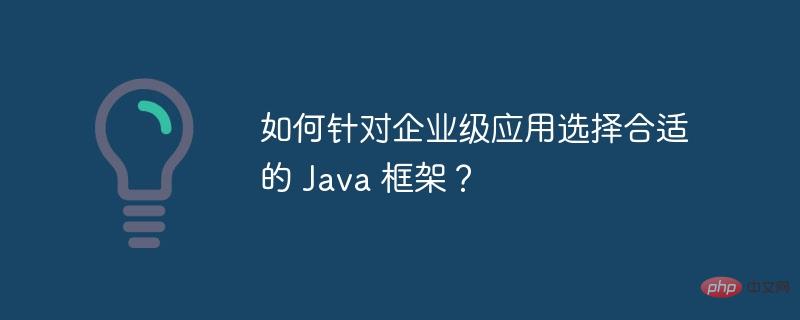
When developing enterprise Java applications, choosing the right framework is crucial. Key considerations include performance, scalability, flexibility, and community support. Popular frameworks include: Spring Framework: widely used, full-featured, and suitable for a variety of applications. Hibernate: Simplifies data persistence, improves performance, and provides advanced query capabilities. Guice: lightweight and fast, focused on simplicity and speed, providing easy DI configuration. H2 Database: Embedded database, no external installation required, improved performance, suitable for prototyping and testing.

How to choose the right Java framework in enterprise-level applications
When developing enterprise-level Java applications, choose the right one Frames are crucial. Java offers a variety of frameworks, each with its own pros and cons. In this article, we’ll explore the key factors to consider when choosing a framework and provide some real-world examples to help you make an informed decision.
Key factors when choosing a framework
Practical Case
1. Spring Framework
Spring Framework is one of the most popular frameworks in Java development one. It provides a series of components, including:
Advantages:
2. Hibernate
Hibernate is an object-relational mapping (ORM) framework that can easily map Java objects to database tables. It provides:
Advantages:
3. Guice
Guice is a dependency injection framework, similar to Spring. However, it offers a more lightweight alternative and focuses on simplicity and speed.
Advantages:
4. H2 Database
H2 Database is an embedded database that can be integrated with Java applications. Instead of having to install a separate database server. It provides:
Advantages :
Conclusion
Choosing the right Java framework is critical to the success of enterprise-level applications. By considering key factors and seeing real-world use cases, you can make informed decisions to optimize your application performance, scalability, and flexibility.
The above is the detailed content of How to choose the right Java framework for enterprise applications?. For more information, please follow other related articles on the PHP Chinese website!
 How to remove the first few elements of an array in php
How to remove the first few elements of an array in php
 What is the difference between blocking and deleting on WeChat?
What is the difference between blocking and deleting on WeChat?
 How to solve the 504 error in cdn
How to solve the 504 error in cdn
 How to solve stackoverflow error
How to solve stackoverflow error
 windows explorer has stopped working
windows explorer has stopped working
 cloud computing technology
cloud computing technology
 Introduction to repeater nesting method
Introduction to repeater nesting method
 What are the dos commands?
What are the dos commands?




